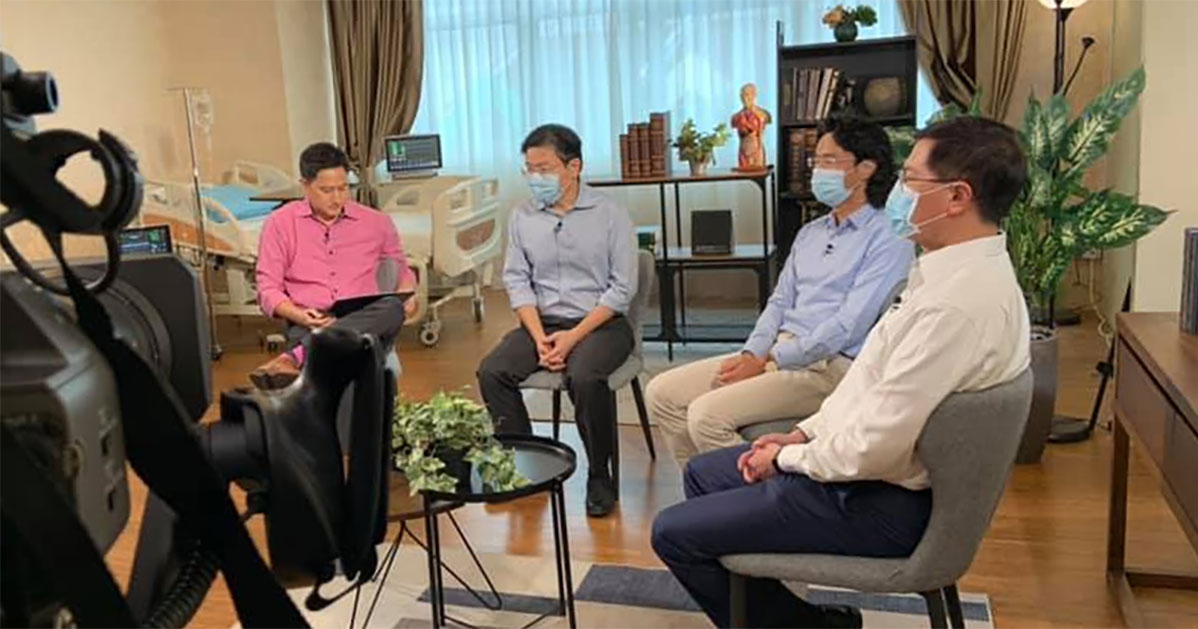Follow us on Telegram for the latest updates on Covid-19: https://t.me/mothershipsg
Those in Singapore who do not want to get the Covid-19 vaccine may require “more frequent testing”, Minister for Education Lawrence Wong said on Jan. 7 in an interview on Talking Point.
Wong, who is the co-chair of the Covid-19 multi-ministry task force, said that those who got vaccinated will be on the receiving end of "tangible benefits".
He said: "It may well be that travellers coming back need not serve SHN (stay-home notice) or will serve a shorter SHN."
"So those will be the benefits of getting a vaccination besides the fact that you are protecting yourself and your loved ones."
On the other hand, those who do not get vaccinated will be subjected to a more frequent testing regime.
He added: “There will be these tangible benefits and those who choose not to be vaccinated, well, then you have to live with more frequent tests, you have to live with quarantine, you have to live with all of these other additional requirements.”
Singapore settled for 3 vaccines initially
Wong also explained that picking the vaccine made by the Chinese biopharmaceutical company Sinovac to be used in Singapore was "to make early bets".
The vaccine, named CoronaVac, is one of three to be used here, but it is not widely adopted and no conclusive studies have been conducted on it yet.
Wong said the government convened an expert panel to look at making early purchases of vaccines “as early as April”.
He revealed that the committee and experts narrowed the selection to 35 vaccine candidates, with Moderna, Pfizer-BioNTech and Sinovac chosen eventually.
No clinical data was made available by any vaccine companies early on.
Wong added: “We have to make early bets in order for Singapore to be near the front of the queue for vaccines. And that's what is happening today.”
When asked by the interviewer if Singapore was "hedging chances" with its purchases, Wong replied: "Very much so."
No choosing of vaccines at this point
Asked if people would be allowed to choose their vaccine, Wong said that the Pfizer-BioNTech and Moderna vaccines worked similarly.
Efficacy rates were “all about the same” around the world.
"I think at this point in time, we have Pfizer only, there's nothing to choose from. So let's go with Pfizer, get people vaccinated on the Pfizer vaccine,” he added.
He also said some vaccines will not be suitable for some subsections of the population, and choice of vaccine will be calibrated with more data in the future.
Timeline of vaccine acquisition
The first advance purchase agreement with Moderna took place in June, which was secured with a downpayment.
The Sinovac vaccine was bought in August, which was when advance talks were ongoing with Pfizer-BioNTech.
The Pfizer-BioNTech vaccine was approved first in the end.
The call was made by Singapore’s Health Sciences Authority (HSA).
The first shipment of vaccines arrived by the end of December, with other vaccines expected in the next several months.
The first doses of the vaccines were administered to staff at the National Centre for Infectious Diseases (NCID) on Dec. 30, 2020.
Wong said buying other vaccines in the future was Singapore's way "not to make a single bet".
Different vaccines work differently
Broadly, there are two ways the three vaccines work.
The Moderna and Pfizer-BioNTech vaccines use the new messenger RNA (mRNA) technology.
Sinovac is a traditional inactivated virus vaccine.
mRNA vaccines teach cells in the body to make a protein that triggers an immune response inside our bodies, said director of communicable diseases at the Ministry of Health (MOH) Associate Professor Vernon Lee who was one of the interviewees.
Traditional vaccines put a weakened or inactivated germ into the body.
Herd immunity in Singapore
Wong said that even in a post-Covid-19 world, there would be pandemics with more virulent diseases that arise in the future.
“I think rather than thinking about let’s go back to life before Covid, I think we should be thinking now about what are the things that we have done during this period that really ought to be permanently part of our new daily routines,” he added.
“And how can we raise our levels of defences, our levels of protection, our levels of hygiene so that we can be more prepared and more resilient in the future?”
However, with herd immunity, it does not mean everyone is protected.
Lee stressed that individuals who do not get vaccinated are “still susceptible” to being infected with Covid-19.
“If we are not vaccinated, every single individual who is not vaccinated, is another naive susceptible individual who then can get infected by those diseases," Lee said.
"To protect yourself, you should get vaccinated and then there’s the other benefit of protecting your loved ones and those around you.”
Lee also said: “It is very important for that reason because even if we have a high vaccination coverage, it does not mean no disease. It is not possible to wipe Covid-19 from the face of the earth. We’re going to see this recurring from time to time, so it is important for that personal protection reason.”
Vaccines work on new strain of Covid-19
Associate Professor Benjamin Ong, senior vice president (Health Education & Resources) at the National University of Singapore (NUS), who was on the programme as well, said the vaccines “probably would still work” on the new B117 strain of Covid-19 that is ravaging parts of the world.
He added that this is being actively tested, but from the mutations that have been studied so far, it seems that the vaccines available now will provide adequate protection.
Listen to our podcast on Covid-19 vaccines here:
https://open.spotify.com/episode/4J0WbwE7j940gAQeKq3cO0?si=lysTT76nREqBd6JCEb2MGw
Top photo via Lawrence Wong Facebook
If you like what you read, follow us on Facebook, Instagram, Twitter and Telegram to get the latest updates.
